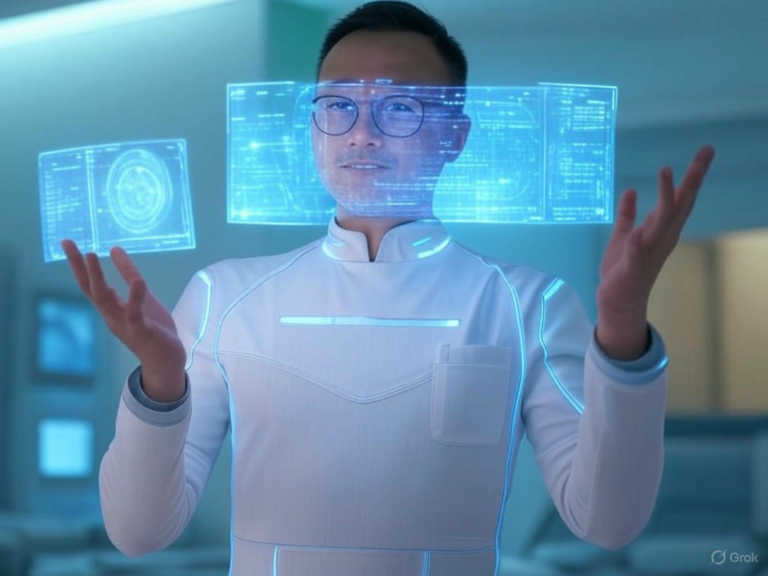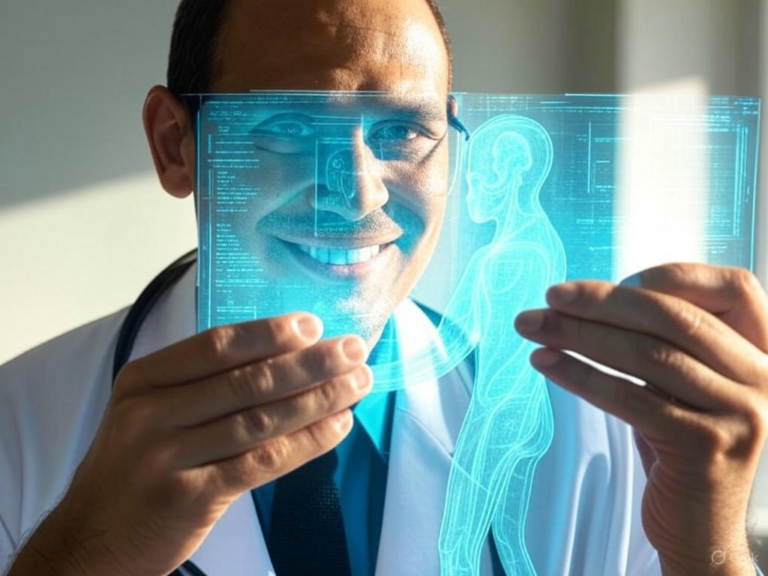
AI in Medicine: Hype or Hope? Exploring Real Impacts
The Current State of AI in Medicine: Beyond the Buzzwords
Have you ever wondered if AI in medicine is just another overhyped trend or a genuine game-changer? Today, AI in medicine is moving from buzzwords to real-world solutions, supporting doctors in clinical decisions, boosting diagnostic accuracy, and tackling healthcare shortages head-on. Let’s break this down with evidence from ongoing applications that are already making a difference.
In healthcare systems worldwide, AI isn’t just theoretical—it’s actively integrated, offering measurable benefits for patients and providers alike. For instance, in areas with limited resources, these tools help extend expertise where it’s needed most, proving that AI in medicine can be a practical ally rather than a distant promise.
Supporting Resource-Limited Healthcare Settings
In regions where specialists are scarce, AI in medicine steps in as a vital support system. Take tuberculosis detection, for example: AI algorithms analyze chest X-rays in remote areas with 95% sensitivity and 100% specificity, as shown in studies from high-burden countries [1]. This means more people get accurate diagnoses without waiting for expert radiologists, freeing up human doctors to handle the toughest cases.
It’s like having an extra team member who never tires, allowing limited medical resources to serve larger populations efficiently. What if we could scale this approach to other diseases? AI in medicine is already doing just that, turning routine screenings into opportunities for early intervention and better outcomes.
Real-World AI Applications Transforming Medicine Today
AI in medicine isn’t about replacing doctors—it’s about enhancing their work with everyday tools that deliver results. From faster diagnoses to smarter patient management, these applications are proving their worth in hospitals and clinics around the globe. Let’s explore how they’re making an impact right now.
Enhanced Medical Imaging Analysis with AI
One of the standout areas for AI in medicine is image analysis, where algorithms process scans like X-rays, CTs, MRIs, and ultrasounds with impressive speed. These systems assist radiologists by highlighting potential issues, prioritizing urgent scans, and even operating independently in some cases. For example, the UK’s NHS uses AI to sift through X-rays, helping radiologists manage higher volumes without compromising care [4].
A great illustration is the IDx-DR system, which detects diabetic retinopathy from retinal photos in minutes, achieving high accuracy without human input [4]. Imagine the relief for patients in rural areas who can now get quick results—it’s a prime example of how AI in medicine is bridging access gaps and saving time.
Clinical Decision Support Systems in AI-Driven Healthcare
AI-powered tools are revolutionizing how doctors make decisions by pulling together data from patient records and guidelines. In managing conditions like type 2 diabetes, these systems generate risk assessments and recommendations almost instantly, cutting down on the manual work that bogs down clinicians. This isn’t just convenient; it’s transformative, letting doctors focus more on patients than paperwork.
Have you considered how this could change your next doctor’s visit? AI in medicine makes complex data digestible, ensuring no critical detail slips through the cracks and improving overall care quality.
Predictive Analytics and Early Warning Systems
In critical care, AI in medicine shines through predictive models that spot trouble before it escalates. By monitoring vital signs, these systems detect patterns that might indicate a patient’s decline, triggering alerts for timely intervention. A study at Mount Sinai Hospital revealed that AI alerts led to 43% more timely care escalations and lower mortality rates compared to traditional methods [4].
This technology even extends to detecting sepsis in newborns, where one AI model outperformed standard approaches by 75% [2]. It’s a powerful reminder that AI in medicine can protect vulnerable populations, turning data into lifesaving actions.
Transforming Healthcare Operations and Patient Experience
Beyond the exam room, AI in medicine is streamlining operations and enhancing how patients experience care. These innovations are making healthcare more efficient and accessible, from home monitoring to administrative tasks. Let’s look at the practical side of this evolution.
Remote Monitoring and Home Care Solutions
AI-driven remote monitoring lets patients track their health at home, sending data to doctors in real time for proactive adjustments. This not only reduces hospital visits but also empowers individuals to manage chronic conditions more effectively [4]. For someone recovering from surgery, this could mean peace of mind and quicker recovery—AI in medicine is making that possible.
By analyzing trends in vital signs, these systems can flag issues early, potentially preventing emergencies. What could this mean for aging populations? More independence and less strain on healthcare facilities.
Administrative Efficiency and Documentation
Doctors often spend hours on paperwork, but AI in medicine is changing that by automating note-taking and scheduling. Tools that transcribe consultations into summaries free up time for what matters most: patient interactions. Add in features like finding on-call staff or answering drug queries, and you’ve got a smoother operation overall [5].
This efficiency boost is a game-changer, allowing healthcare teams to prioritize empathy and expertise. Imagine a world where admin work is handled seamlessly—AI in medicine is bringing us closer to that reality.
Unlocking Value from Legacy Health Data
Healthcare generates mountains of data from billions of imaging procedures each year, much of it unused. AI in medicine helps by organizing and analyzing this information, uncovering insights for better diagnoses and research [4]. It’s like discovering hidden treasures in old files, leading to advancements we couldn’t see before.
For researchers, this means faster progress in understanding diseases. How might this data reshape treatments in the future? It’s an exciting frontier.
The Frontier: Advanced Applications in AI for Medicine
As AI in medicine evolves, cutting-edge uses are emerging that could redefine medical practice. From drug development to personalized treatments, these innovations hold promise for the next wave of healthcare. Let’s dive into what’s on the horizon.
Drug Discovery and Development
Companies like Verge Genomics are leveraging AI to speed up drug discovery for diseases such as Parkinson’s and Alzheimer’s, analyzing genomic data to find effective candidates more affordably [5]. This approach predicts side effects and optimizes dosages, potentially shortening development timelines from years to months.
It’s a collaborative effort between AI and human scientists, showing how AI in medicine can accelerate breakthroughs that benefit millions. Could this lead to cures for currently untreatable conditions? The potential is thrilling.
Personalized Medicine Approaches
AI in medicine is making treatments more individual by considering genetics, lifestyle, and history. This shifts from generic plans to tailored strategies, improving effectiveness and reducing side effects [4][5]. For cancer patients, for instance, AI can suggest therapies based on tumor specifics.
This level of customization feels almost custom-made, like a suit fitted just for you. What if every treatment was this precise? It’s a vision that’s becoming reality through AI advancements.
Bringing Specialist Expertise via AI in Medicine
AI bridges gaps in primary care by providing instant specialist-level analysis, such as evaluating skin images for potential issues. Low-risk cases get quick reassurance, while high-risk ones fast-track to experts [1]. This is especially useful in underserved areas, where access to dermatologists might be limited.
By expanding to other fields like cardiology, AI in medicine democratizes expertise. How can this technology bring world-class care to your community? It’s already happening in pockets around the globe.
Challenges and Limitations: A Balanced Perspective on AI in Medicine
While AI in medicine offers exciting possibilities, it’s not without hurdles. Accuracy issues and the need for oversight are real concerns that keep things grounded. Let’s examine these challenges honestly.
Accuracy and Reliability Concerns
AI systems can sometimes generate errors, like mixing facts with fabrications, which is risky in healthcare [8]. This “hallucination” problem underscores the importance of verifying AI outputs before relying on them.
Still, with proper testing, AI in medicine can minimize these risks. How do we ensure reliability? Continuous improvements and human checks are key.
The Need for Human Oversight
The best AI applications work alongside humans, augmenting skills rather than replacing them [6]. Governance frameworks are essential to maintain this balance, ensuring ethical and safe use.
Think of it as a partnership: AI handles data crunching, while doctors provide the intuition. In AI in medicine, this synergy drives the most reliable progress.
The Future of AI in Medicine: Realistic Expectations
Looking ahead, AI in medicine will integrate deeper into daily workflows, from data analysis to global health solutions. But it’s an evolution, not an overnight revolution. Here’s what we can anticipate.
Integration into Clinical Workflows
Future systems will pull key info from records to aid decisions, starting with efficiency gains and moving to active guidance [1]. This requires rigorous validation to build trust.
For clinicians, this could mean less guesswork and more confidence. How might this change your healthcare experience? It’s about making medicine smarter, not automated.
Bridging Research and Clinical Practice
AI in medicine will analyze vast datasets to speed up research translation, spotting patterns in genomics and beyond. This could lead to quicker innovations in personalized treatments.
By connecting dots humans might overlook, AI accelerates progress. What new discoveries await? The potential is vast.
Addressing Global Healthcare Challenges
AI in medicine could tackle disparities by extending expertise to remote areas, supporting diagnostics where specialists are absent. This might be its greatest impact yet.
Imagine equitable care worldwide—AI is paving the way. How can we support this growth? Through investment and collaboration.
Conclusion: AI in Medicine – More Evolution Than Revolution
In the end, AI in medicine strikes a balance between hype and hope, delivering real benefits like improved diagnostics and efficient operations. By viewing it as a tool that enhances human expertise, we can maximize its advantages while addressing limitations.
If you’re curious about how this technology might affect your health, I encourage you to share your thoughts in the comments or explore more on our site. What are your experiences with AI in medicine? Let’s discuss and learn together.
References
- [1] PMC: Artificial Intelligence in Medicine – Applications and Challenges
- [2] Xiahe Publishing: AI in Emergency Medicine – ERHM-2023-00048
- [4] Empeek Insights: Top AI Applications in Healthcare – Full Article
- [5] PMC: Machine Learning in Healthcare – Research Overview
- [6] Kaushik Blog: AI Implications – Broader AI Insights (applied contextually)
- [8] Chestnut Herbs: Risks of AI in Practice – Cautionary Example
AI in medicine, healthcare AI applications, medical artificial intelligence, AI diagnosis, AI in healthcare, medical AI impacts, AI treatment innovations, patient care AI, AI diagnostics, future of healthcare AI







